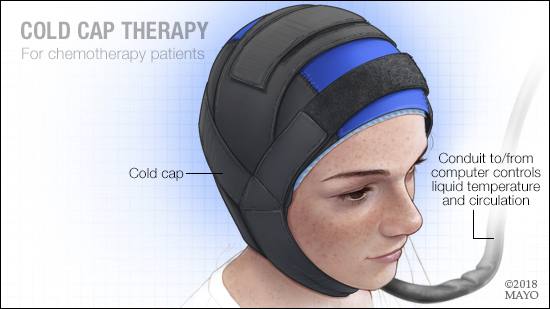Chemo
Cancer gets real with a single word — a prefix, actually, and predictions of hair loss, weight loss, wigs and weakness.
Most patients, upon receiving a breast cancer diagnosis, immediately imagine themselves without hair.
In Key West, Alyson Crean, public information officer for the City of Key West and the Key West Police Department recently defeated breast cancer following surgery, five months of chemotherapy, radiation and follow-up infusions.
And she faced it all head-on. Bald, bold and prepared for battle.
“Not hiding my baldness made me feel like a warrior,” said Crean, who never expected the compliment, “You’ve got a great skull.”
But the hair loss typically associated with chemotherapy affects women differently, especially those with young children, or in cold climates.
Emerging technology, in the form of “cold caps,” is showing promising results in preserving hair in women undergoing various forms of chemotherapy for breast cancer treatment.
The tight-fitting caps are worn during chemotherapy infusions and are cooled to -15 to -40 degrees Fahrenheit.
“Cold caps and scalp-cooling systems work by narrowing the blood vessels beneath the skin of the scalp, reducing the amount of chemotherapy medicine that reaches the hair follicles,” Pam Harrison wrote in a 2017 article, “Scalp Cooling to Prevent Chemo Hair Loss Shows Promise,” for Medscape Medical News. “With less chemotherapy medicine in the follicles, the hair may be less likely to fall out. The cold also decreases the activity of the hair follicles, which slows down cell division and makes the follicles less affected by the chemotherapy medicine.
“It’s important to know that cold caps and scalp cooling systems may not work for everyone,” Harrison wrote. “Research results show that cold caps and scalp cooling systems were considered highly effective in 50% to about 65% of the women who used them.”
Dr. Howard (Jack) West, of the Swedish Cancer Institute in Seattle, said that clinicians have not prioritized hair preservation during chemotherapy as much as they perhaps should have based on what matters to patients.
Hair loss is not a trivial consequence of chemotherapy for many patients, he emphasized.
“I think many people, especially women, may factor the potential for alopecia into their decision about receiving chemotherapy, and this could potentially lead to patients being undertreated because of their concerns about this side effect,” West said.
Women who use cold caps are advised to treat their hair gently and avoid blow-drying, hot rollers, straighteners and infrequent shampooing.
The cost of using the caps varies depending on whether the patient buys or rents one from the cancer center.
“Some users have said the cost of the caps is comparable to the cost of a having a wig made,” Harrison wrote.
Financial assistance may be available for patients interested in the cooling caps. The Rapunzel Project is a nonprofit organization that helps women and men undergoing chemotherapy access and use scalp-cooling technology to help keep their hair. The Hair to Stay Foundation also offers grants to pay for scalp cooling costs.

























